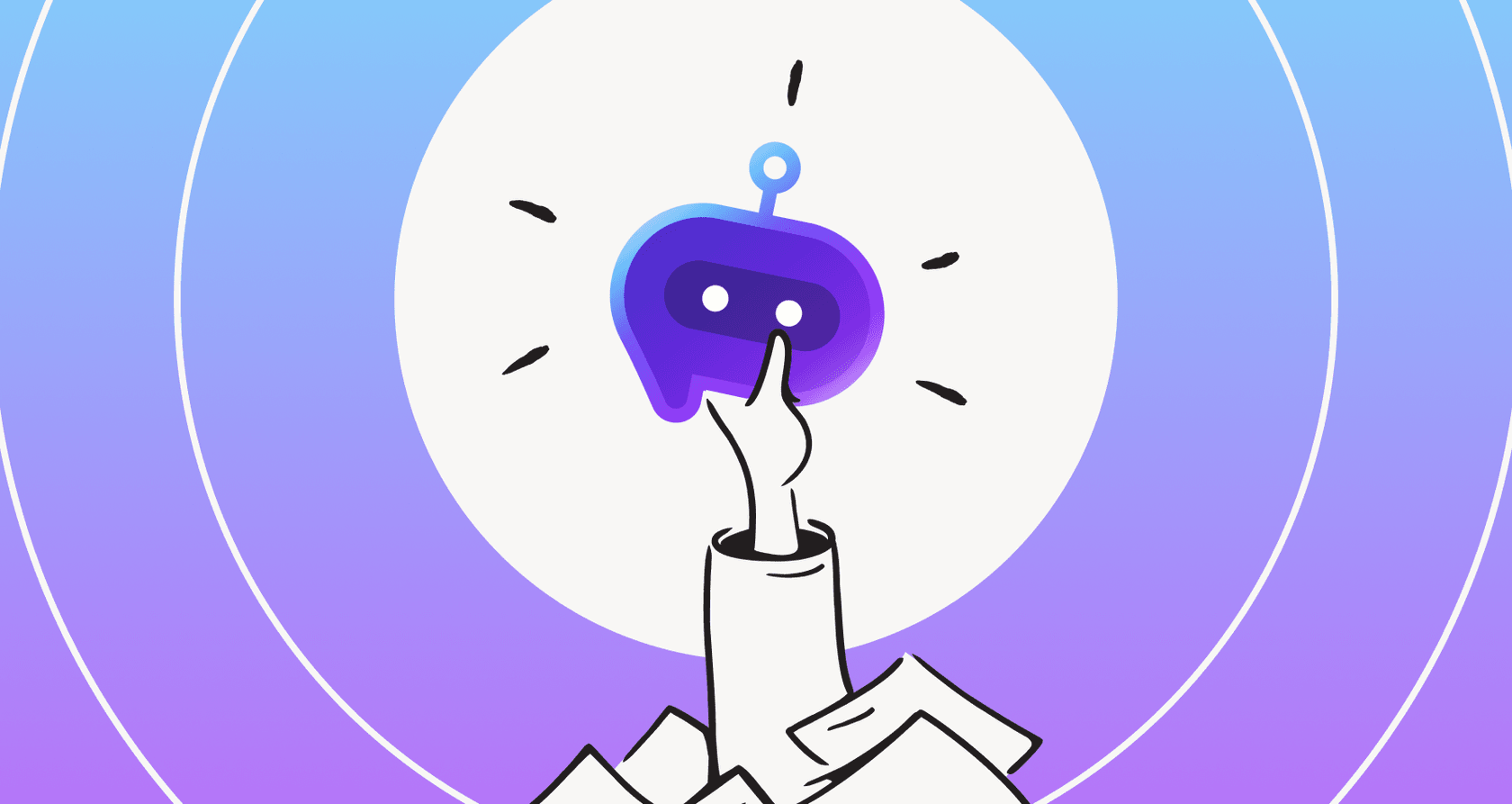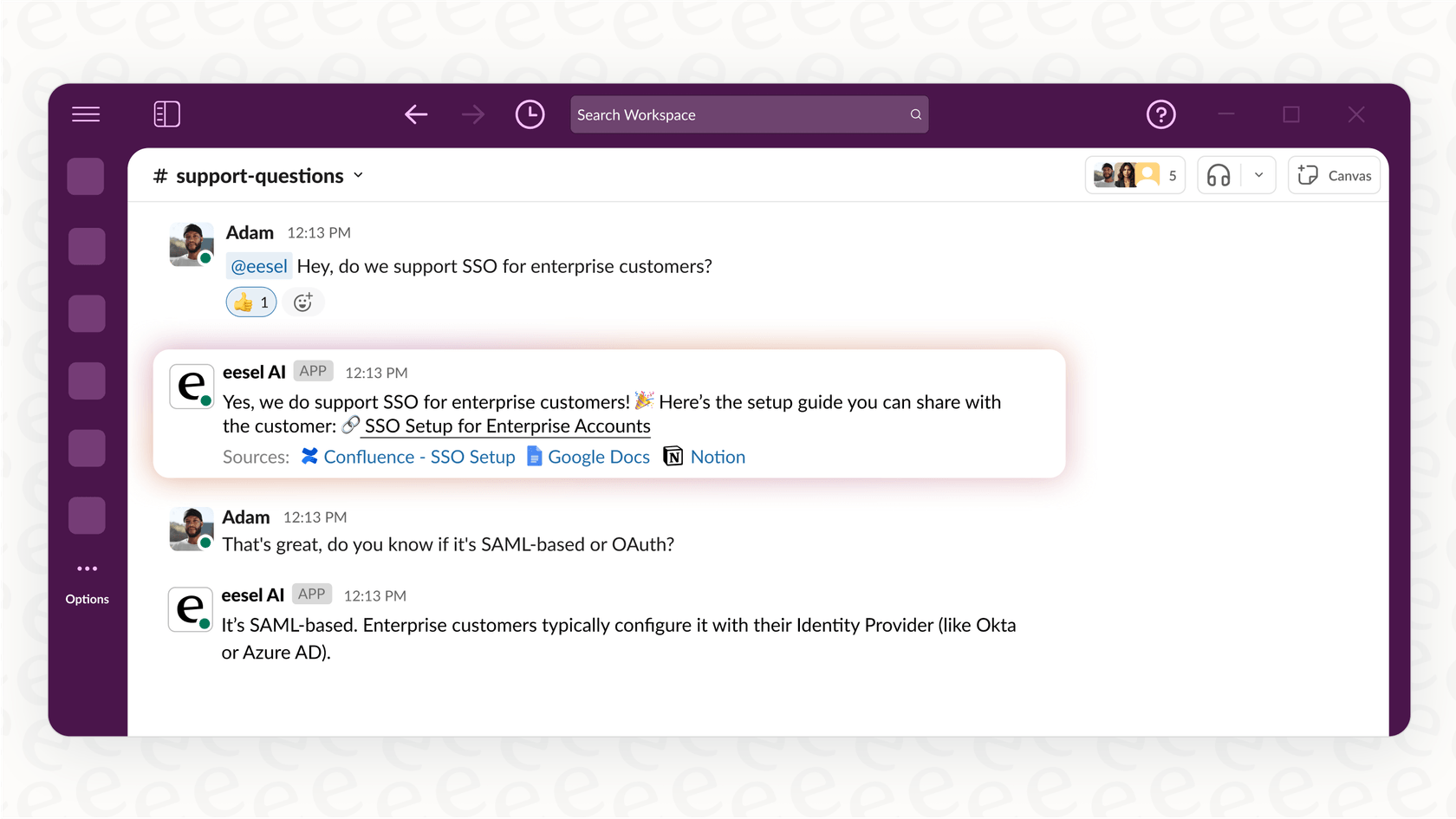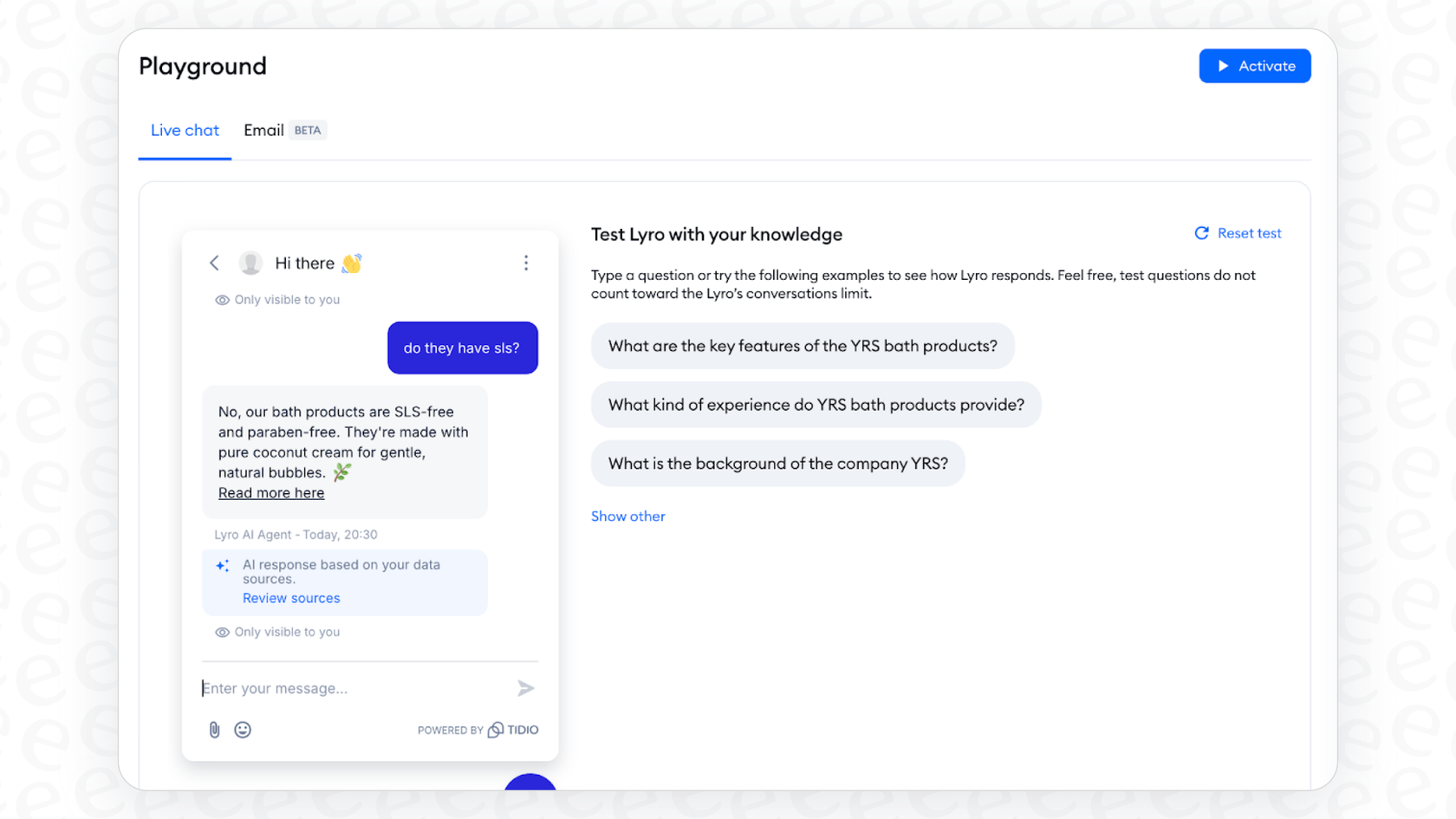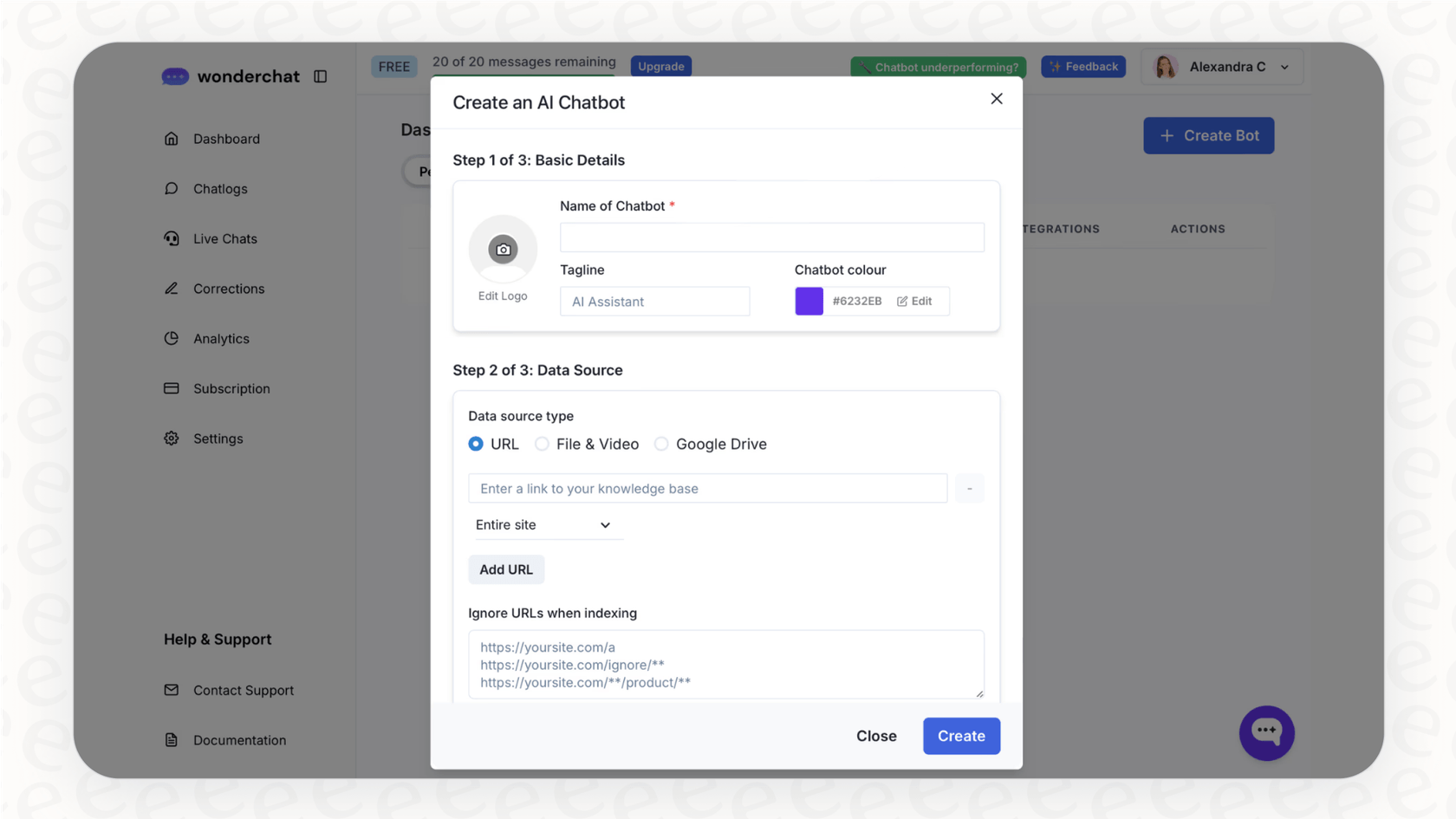I tested 7 Botsonic alternatives: Here's the best AI chatbot in 2025

Kenneth Pangan

Stanley Nicholas
Last edited December 4, 2025
Expert Verified

Okay, so you’ve got an AI chatbot like Botsonic up and running. It’s handling the simple FAQs and maybe grabbing a few leads. That's a solid start. But if you’re reading this, you’ve probably hit the same point I did, where you start wondering, "what's next?" You need a bot that does more than just skim your help center, one that actually plugs into your helpdesk, understands your business, and doesn’t make your finance team nervous every time you have a busy month.
This isn’t just another roundup post. I’ve actually gone through the setup process, kicked the tires, and compared the top Botsonic alternatives for teams that are ready for an upgrade. We’re moving beyond basic Q&A bots to find a tool that can be a real partner for your support team. Let's dig in and find the right fit for you.
What is an AI chatbot builder?
Put simply, an AI chatbot builder is a platform that lets you create an AI assistant without writing any code. You just feed it your company knowledge, things like help center articles, internal documents, and website pages, and it learns how to answer questions on your behalf.
The whole idea is to put this chatbot on your website or connect it to apps like Slack or your helpdesk. It provides instant, 24/7 answers, which frees up your human team to focus on the more complicated problems that need a personal touch.

Our criteria for the best Botsonic alternatives
Not all AI chatbots are the same. A bot that’s perfect for a small Shopify store won’t cut it for a support team buried in tickets. To find the really good options, I judged each platform on a few things that actually matter when you’re trying to grow.
-
Does it connect to my existing tools? A good alternative should hook into helpdesks like Zendesk and Freshdesk, chat tools like Slack, and e-commerce platforms like Shopify, without making you change how you work.
-
Can it do more than just answer questions? I looked for platforms that could handle real tasks, like sorting tickets, looking up live order info, or passing a conversation to the right person.
-
How easy is it to set up? Could I get it running myself in a few minutes? Or was I stuck in a sales demo and a lengthy onboarding process?
-
What’s the pricing really like? I was on the lookout for hidden fees, especially those per-resolution or per-message costs that can turn a good month into a budget headache.
-
How much control do I have? I wanted to see if I could define the AI’s personality, restrict its knowledge, and tell it exactly which questions it should and shouldn't handle.
Quick comparison of the top Botsonic alternatives in 2025
Here’s a quick glance at how the top contenders measure up.
| Tool | Best For | Key Integrations | Pricing Model | Standout Feature |
|---|---|---|---|---|
| eesel AI | Deep helpdesk automation | Zendesk, Freshdesk, Slack, Confluence | Flat fee (no per-resolution costs) | Risk-free ticket simulation |
| Tidio | All-in-one live chat & simple bots | Shopify, WordPress, Zapier | Per conversation/seat | Strong free plan |
| Denser.ai | High-accuracy semantic search | Zapier, various CRMs | Query-based | Understands context over keywords |
| Wonderchat | Source-backed answer reliability | Zendesk, Freshdesk, HubSpot | Per message | Cites sources in responses |
| Social Intents | Human + AI hybrid support | MS Teams, Slack, Webex | Per seat (unlimited agents) | Live chat inside existing chat tools |
| Chat Thing | Connecting diverse knowledge sources | Notion, Google Drive, YouTube | Message-token-based | Extensive data source options |
A deep dive into the 6 best Botsonic alternatives
Alright, let's get into the nitty-gritty of what makes each of these platforms a solid choice.
1. eesel AI
eesel AI is a bit different from your standard website chatbot. It’s an automation platform built to work inside the tools your support team already uses, like Zendesk or Freshdesk. The goal is to automate your frontline support without forcing you to ditch your current helpdesk. It learns from your past tickets and internal docs to draft replies, sort new tickets, and even resolve common issues all by itself.
eesel AI Agent automatically answering and resolving a ticket in Zendesk. Pros:
-
You can actually set it up yourself. Seriously, you can sign up and get a bot running in minutes without ever talking to a salesperson. It’s a nice change of pace.
-
It offers a risk-free simulation. This is a big one. eesel AI can run a simulation on your past tickets to show you exactly how it would have performed. You get a clear, data-backed preview of its resolution rate before you let it talk to a single customer.
-
It works with your helpdesk, not around it. This means it improves your current setup by automating tasks like tagging and routing, instead of making your agents learn yet another tool.
-
The pricing is predictable. The plans are based on interaction volume, but there are no sneaky per-resolution fees. You won’t get a massive bill just because the bot did its job well.

Cons:
- It’s really focused on customer support and internal helpdesks. If you're just looking for a bot to handle sales or marketing, other options might be a better fit.
Pricing: Their pricing plans start with the Team plan at $299/month for up to 1,000 AI interactions. The Business plan at $799/month gives you 3,000 interactions and adds important features like training on past tickets and AI-powered ticket triage.
Why it's on the list: For teams that are serious about support automation, eesel AI is a clear winner. It gives you real power and control, works with your existing setup, and provides a safe, predictable way to use AI to make a difference.
2. Tidio
You’ve probably seen Tidio around. It’s a popular all-in-one tool that bundles live chat, chatbots, and marketing features into one widget. It’s a great starting point for small businesses and e-commerce sites that want an easy way to talk to website visitors and handle basic questions.

Pros:
-
It has one of the most generous free plans out there.
-
The visual flow builder is pretty easy for non-technical folks to figure out.
-
It keeps live chat, AI, and proactive messages all in one place, which simplifies things.
Cons:
- While their AI, Lyro, is pretty good, the pricing can get complicated and expensive, fast. Since costs are tied to how many conversations you have, a busy month can easily bump you into a higher-priced plan.
Pricing: Tidio has a free plan that includes 50 live chat conversations. Paid plans are a bit complex. The Lyro AI Agent plan starts at $32.50/month for 50 AI conversations. The bundled Starter plan is $24.17/month and includes 100 live chat conversations, while the Growth plan at $49.17/month gets you 250 conversations.
Why it's on the list: It's a user-friendly, all-in-one option for teams who still want a strong live chat component and are just dipping their toes into automation.
3. Denser.ai
Denser.ai takes a different approach by focusing on semantic AI. In plain English, that means it tries to understand the actual meaning and intent behind a question, not just the keywords. The result is often more accurate answers, especially for more complex or oddly-phrased questions.
Pros:
-
It provides high-quality, context-aware responses that feel more natural.
-
The AI is designed to learn and get better from its interactions over time.
Cons:
-
The pricing is based on the number of queries, which can be hard to predict and budget for.
-
The setup can get a bit more technical if you have very specific needs.
Pricing: Denser.ai offers a Free plan with 20 queries per month. Paid plans start with the Starter tier at $29/month for 1,500 queries and go up to the Business plan at $399/month for 15,000 queries.
Why it's on the list: If your absolute top priority is getting the most accurate answers possible, especially for complex or niche topics, Denser.ai's approach is worth checking out.
4. Wonderchat
Wonderchat’s main selling point is its focus on accuracy and trust. Every single answer the chatbot gives includes a citation that links back to the source material it used, whether that's a page on your website or a PDF. This is great for preventing the AI from making things up and gives users confidence in the answers.

Pros:
-
Source-backed responses build trust and make it easy to verify information.
-
It has a simple self-improvement feature where you can correct answers to make the bot smarter.
-
It offers easy, one-click connections to major helpdesks.
Cons:
- While the interface is clean, it might not have the deep, custom workflow options that more advanced platforms offer.
Pricing: Wonderchat has a free forever plan that includes 20 messages. Paid plans start at $49/month.
Why it's on the list: It's a perfect fit for any business where factual accuracy is non-negotiable. If you're in a regulated field or just can't risk your bot giving out wrong information, those source citations are fantastic.
5. Social Intents
This one is for teams that live and breathe in Slack or Microsoft Teams. Social Intents combines a solid AI chatbot with a smooth handoff to human agents, who can jump into live chats without ever leaving their main collaboration tool.
Pros:
-
It’s great for a hybrid approach where AI handles the first contact and humans take over for complex stuff.
-
Your agents don't have to learn a whole new piece of software.
-
Paid plans include unlimited team members, which is a great deal.
Cons:
- It’s very focused on the live chat experience, so it’s not the best choice if you're looking for backend ticket automation (like automatic tagging or routing).
Pricing: Social Intents plans start at $49/month for the Starter plan (up to 3 agents). The Basic plan at $79/month and higher tiers include unlimited agent seats.
Why it's on the list: It's the ideal tool for teams who want to manage both AI and human chats in one place, right inside Slack or MS Teams.
6. Chat Thing
Chat Thing's superpower is its flexibility. While most bots can read your website or a few PDFs, Chat Thing can be trained on a huge variety of content, including Notion pages, Google Drive folders, and even YouTube video transcripts. This makes it a great way to bring together knowledge that's scattered all over the place.
Pros:
-
It connects to an unmatched number of knowledge sources.
-
Auto-syncing keeps your bot's knowledge base fresh and up-to-date.
-
It gives you the flexibility to choose from over 20 different AI models.
Cons:
-
The pricing is based on "storage tokens" and "message tokens," which is confusing and makes it really hard to predict your monthly costs.
-
The huge number of options can be a bit overwhelming if you just want a simple setup.
Pricing: Chat Thing has a free tier for small projects. Paid plans are billed annually and start with the Basic plan at $11.67/month, going up to the Enterprise plan at $249.17/month with higher token limits.
Why it's on the list: It’s the best option for power-users whose company knowledge is spread far and wide and who need one bot that can tap into all of it.
How to choose the right Botsonic alternatives for your business
Feeling a bit stuck? Here’s a simple way to break it down and find the right tool.
Figure out your needs
Get really clear on your main goal. Are you trying to reduce customer service tickets, automate internal IT support, or capture more sales leads? The best tool for one job isn't always the right one for another. Nail down your objective first.
Look at your existing tools
The right chatbot should feel like a natural part of your workflow, not another headache. If your team is in a helpdesk like Zendesk all day, a tool with deep, direct integration like eesel AI is going to be way more helpful than a standalone widget.
Don't get fooled by the pricing
Don't just look at the starting price. A cheap-looking plan based on per-conversation fees can get expensive in a hurry. A predictable, flat-fee model means you know exactly what you're paying and can grow your support volume without worrying about a surprise bill.
Always try before you buy
You can read reviews all day, but the only way to know if an AI will work for your business is to test it on your actual customer questions. Look for platforms that offer a free trial. Even better, find one with a risk-free simulation that shows you how it performs on your real data before you ever turn it on for customers.
Go beyond simple chatbots: Choosing eesel AI
While Botsonic is a solid tool for getting started, scaling your support means you need more than a simple FAQ bot. The best alternatives on the market offer deeper connections with the tools you already use, give you more control, and come with pricing models that make sense for a growing business.
eesel AI is built for that next step. It plugs right into your helpdesk, lets you test its performance with a powerful simulation, and gives you total control over your automation. You don't have to tear out your existing tools or take a gamble on an AI you haven't tested.
Ready to see how much support you can actually automate? Sign up for eesel AI and run your first simulation for free.
Frequently asked questions
While a basic chatbot is a good start, many Botsonic alternatives offer deeper integrations with your helpdesk, handle more complex tasks, and provide greater control over automation. They can move beyond simple FAQs to become a more integral part of your support operations.
Look for Botsonic alternatives that seamlessly connect with your existing helpdesk (like Zendesk or Freshdesk), chat tools (like Slack or MS Teams), and e-commerce platforms (like Shopify). Deep integrations ensure the AI works with your current workflow, not against it.
Pay close attention to pricing models that charge per-resolution or per-message, as these can lead to unpredictable, high bills during busy periods. Prioritize Botsonic alternatives with flat-fee or predictable volume-based pricing to ensure budget stability.
Yes, several Botsonic alternatives are designed for advanced tasks. Platforms like eesel AI can automate ticket sorting, draft replies, and even resolve common issues directly within your helpdesk, freeing up human agents for complex problems.
Absolutely. Some Botsonic alternatives, notably eesel AI, offer risk-free simulations where the AI processes your past tickets to show its potential resolution rate. This allows you to see its performance with your real data before deploying it live.
Denser.ai specializes in semantic AI to understand the meaning behind complex questions for higher accuracy. Wonderchat also focuses on accuracy by providing source-backed responses, citing the exact material used for its answers.
Share this post

Article by
Kenneth Pangan
Writer and marketer for over ten years, Kenneth Pangan splits his time between history, politics, and art with plenty of interruptions from his dogs demanding attention.





